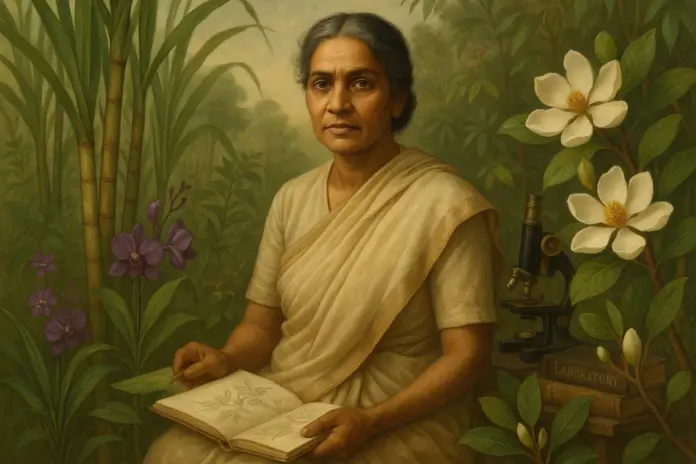“In a world that didn’t expect women to enter science, she bloomed with brilliance and became a symbol of India’s scientific strength.”
Janaki Ammal Edavaleth Kakkat (1897–1984) was not just a botanist; she was a revolutionary mind, a bold woman, and a true daughter of India who broke barriers in science and society. In a time when women’s education was still a distant dream for many, she dared to dream and, more importantly, dared to achieve.
Early Life & Education
Born in Tellicherry (now Thalassery) in Kerala, Janaki Ammal grew up in a time when societal norms rarely allowed girls to pursue higher education. But her father, a sub-judge and progressive thinker, encouraged her education.
She pursued a degree in botany from Queen Mary’s College, Madras, and later went to the University of Michigan, USA, where she earned her Master’s and Doctorate in Botany – becoming one of the first Indian women to earn a Ph.D. in Science.
A Pioneer in Plant Genetics
Her research focused on cytogenetics (the study of chromosomes) and plant breeding. She made significant contributions to:
-
Sugarcane breeding: She helped improve varieties suitable for India’s climate, enhancing sweetness and yield.
-
Chromosomal studies in plants like magnolias, orchids, and eggplants.
-
Botanical classification: She co-authored “The Chromosome Atlas of Cultivated Plants,” a key global scientific reference.
Breaking Gender Barriers
Janaki Ammal worked at a time when Indian science was heavily male-dominated. Yet, her excellence earned her international respect. In Britain, she worked at the John Innes Horticultural Institution and the Royal Horticultural Society.
In 1940s, Prime Minister Jawaharlal Nehru personally invited her back to India to work at the Botanical Survey of India to revamp it. She later became its first Indian Director-General.
Defender of Nature
Janaki wasn’t just a lab scientist – she was a nature lover and early environmentalist. She stood firmly against deforestation and the destruction of native plants. She fought to protect Kerala’s natural biodiversity, especially from the damage of monoculture plantations like eucalyptus.
Honors & Legacy
-
Awarded Padma Shri in 1977 for her contributions to science.
-
A plant genus Janakia and a variety of Magnolia are named in her honor.
-
The Ministry of Environment and the Botanical Survey of India jointly established the Janaki Ammal National Award in her memory to encourage women scientists.
The Forgotten Icon We Must Remember
Despite her global recognition and extraordinary contributions, Janaki Ammal’s story remains largely unknown to the public. But today, more than ever, we need to tell her story.
A story of courage, brilliance, and patriotism.
A story of a woman who nurtured the soil of Indian science and stood for nature when few did.
Let Her Legacy Grow!
Janaki Ammal’s life is a reminder that one determined woman can change the course of science. Her seeds of knowledge continue to grow through every scientist she inspires today.
🇮🇳 Janaki Ammal – The Root of India’s Scientific Renaissance.









